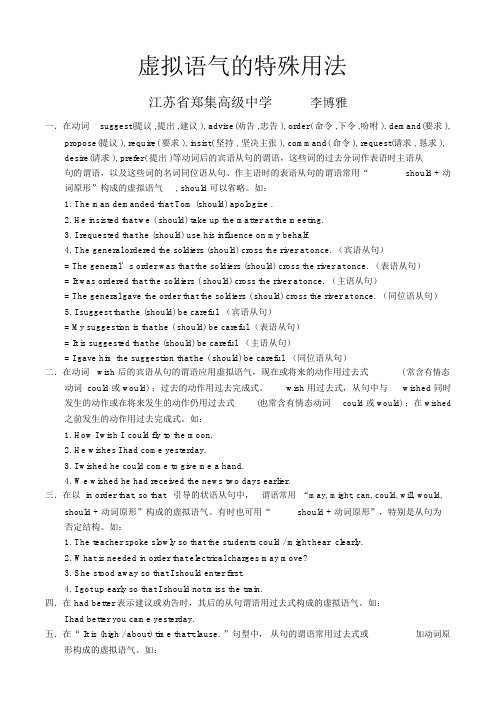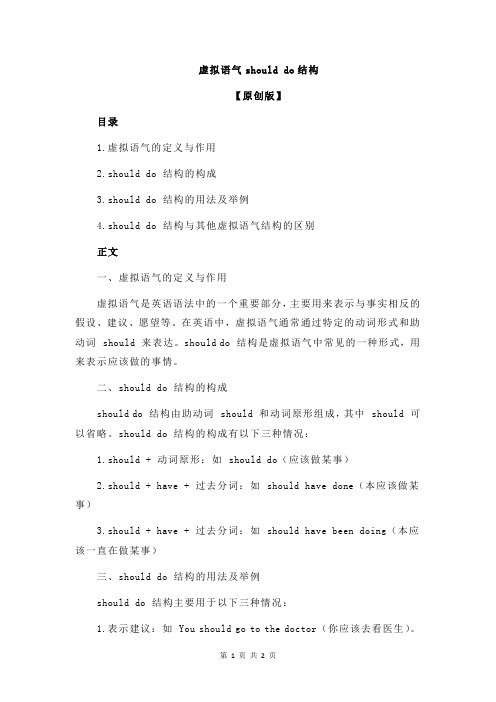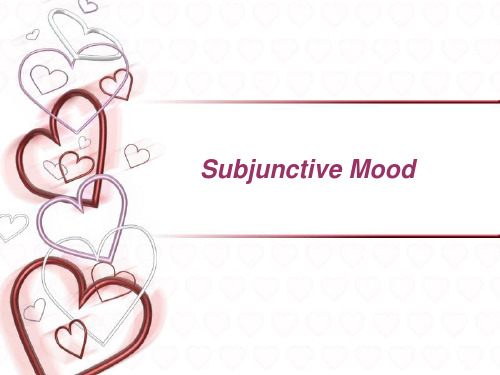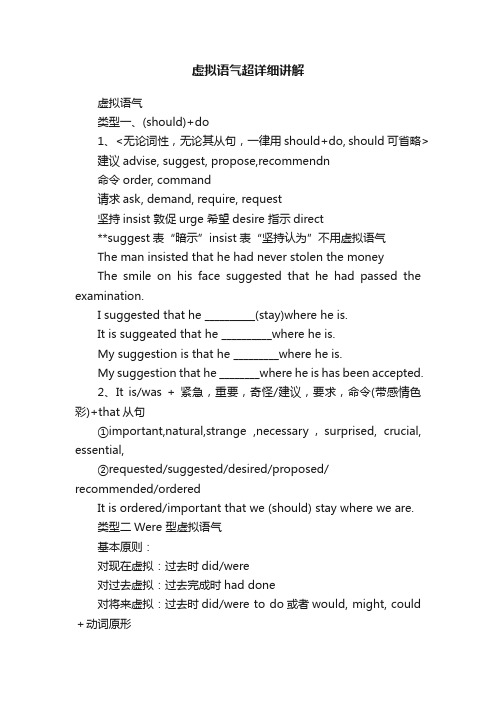虚拟语气中should何时省略
虚拟语气的特殊用法

虚拟语气的特殊用法江苏省郑集高级中学李博雅一.在动词suggest(提议 ,提出 ,建议 ), advise(劝告 ,忠告 ), order( 命令 ,下令 ,吩咐 ), demand(要求 ), propose(提议 ), require( 要求 ), insist( 坚持 , 坚决主张 ), command( 命令 ), request(请求 , 恳求 ), desire(请求 ), prefer( 提出 )等动词后的宾语从句的谓语,这些词的过去分词作表语时主语从句的谓语,以及这些词的名词同位语从句、作主语时的表语从句的谓语常用“should + 动词原形”构成的虚拟语气, should 可以省略。
如:1.The man demanded that Tom (should) apologize .2.He insisted that we ( should) take up the matter at the meeting.3.I requested that he (should) use his influence on my behalf.4.The general ordered the soldiers (should) cross the river at once. (宾语从句)=The general’s order was that the soldiers (should) cross the river at once. (表语从句)=It was ordered that the soldiers ( should) cross the river at once. (主语从句)=The general gave the order that the soldiers ( should) cross the river at once. (同位语从句)5. I suggest that he (should) be careful. (宾语从句)=My suggestion is that he ( should) be careful.(表语从句)=It is suggested that he (should) be careful. (主语从句)=I gave him the suggestion that he ( should) be careful. (同位语从句)二.在动词wish 后的宾语从句的谓语应用虚拟语气,现在或将来的动作用过去式( 常含有情态动词 could 或 would) ;过去的动作用过去完成式。
虚拟语气的规则总结

虚拟语气虚拟语气:表示动作或状态不是客观存在的事实,而是说话人的主观愿望、假设或推测等。
一、if从句:(二)错综时间的虚拟句:通常情况下,在条件句中主句和从句的谓语动词所指时间一致, 但有时也可能指不同的时间,这时主句和从句的动作不是发生在同一时间,其动词形式要根据时间而定。
1. If I were you, I would have taken his advice. (从句指现在, 主句指过去)。
2. If I had taken my raincoat with me this morning, I would not be wet now. (从句指过去,主句指现在)。
3. If we hadn’t been working hard in the past few years, things wouldn’t be going so smoothly.(从句指过去,主句指现在)。
4. If the weather had been more favorable, the crops would be growing still better.(从句指过去,主句指现在)。
5. If we had not got everything ready by now, we should be having a more terrible time tomorrow. (从句指现在,主句指将来)??(三)省略:If 从句中含有were, should, had时,可省略if并把were, should, had提前。
例如:Were I you, I wouldn’t quarrel with him.备注:注:would, should, could与might的选择:①一般常用would,如同在真实条件句中主句常要用will一样。
常译作“将、就会”。
如:If I knew him, I would ask him for help. 如果我认识他的话,我就会向他求助。
虚拟语气should do结构

虚拟语气should do结构【原创版】目录1.虚拟语气的定义与作用2.should do 结构的构成3.should do 结构的用法及举例4.should do 结构与其他虚拟语气结构的区别正文一、虚拟语气的定义与作用虚拟语气是英语语法中的一个重要部分,主要用来表示与事实相反的假设、建议、愿望等。
在英语中,虚拟语气通常通过特定的动词形式和助动词 should 来表达。
should do 结构是虚拟语气中常见的一种形式,用来表示应该做的事情。
二、should do 结构的构成should do 结构由助动词 should 和动词原形组成,其中 should 可以省略。
should do 结构的构成有以下三种情况:1.should + 动词原形:如 should do(应该做某事)2.should + have + 过去分词:如 should have done(本应该做某事)3.should + have + 过去分词:如 should have been doing(本应该一直在做某事)三、should do 结构的用法及举例should do 结构主要用于以下三种情况:1.表示建议:如 You should go to the doctor(你应该去看医生)。
2.表示应该做的事情:如 We should help each other(我们应该互相帮助)。
3.表示对过去的评价:如 She should have finished her homework yesterday(她昨天本应该完成她的作业)。
四、should do 结构与其他虚拟语气结构的区别should do 结构是虚拟语气中的一种,但它与其他虚拟语气结构有所不同。
例如,与表示对过去的虚拟语气(would + have + 过去分词)相比,should do 结构表示的是应该做的事情,而 would + have + 过去分词表示的是与过去事实相反的假设。
虚拟语气完整用法

虚拟语气一、用固定的情态动词表示的虚拟语气1、 should +动词原形(有时省略should)(1)用在动词如advise, request, require, suggest, urge,demand,desire,command, insist, order, propose, recommend, 等后的宾语从句中。
例如:1)They requested that we (should) send a invitation to their school、2)He urged that he acquaint and apply the methods、2、用在it is suggested,it has been decided, it is desired, it was proposed,it is required, it was ordered, it is necessary (essential, imperative, important, desirable) that等引出的主语从句中。
例如:1)It is required that we (should) get everything done by tomorrow night、2)It is imperative that the teachers (should) have a thorough knowledge of the subject they teach、3、用在suggestion, motion, proposal, order, recommendation, plan, idea, requirement等引起的表语从句与同位语从句例如:She drives her vessel carefully lest she should lost her way、4.用在表示比拟的方式状语从句中例如:He laughed as if he had never been happier before、5.用在表示虚拟情况的定语从句中例如:It is high time you stop bitting your child、6.用在某些表示主观愿望的名词从句中例1:I wish I were as tall as you、例2:He insisted that we (should) catch up the first bus in the morning、7.用在婉转的请求、建议、批评等句子中例1:Could you hand me some pepper?例2:You might have told me earlier、例3:Hadn’t you better go and see you lover ?8.用在表示祝愿的简单句中例1:Long live world peace、例2:May you best、二.虚拟语气谓语动词的几种表现形式:1.用于虚拟条件句中虚拟条件句及其主句的谓语形式可归纳如下:从句谓语主句谓语与现在事实相反 were, did would (should, could, might) + v、与将来事实相反 should do, would (should, could, might) + v、(可能性极小) were+to+v、与过去事实相反 had done would (should, could, might) + have done例1:I could definitely see the final score if I had the time、例2:How nice it would be if you could bring a gift、例3:Thay might have arrived on time if the car haven’t broken down on the road、如果条件从句中包含有were, had, should或could,有时可把if省略掉,但这时要把were, had, should或could放在主语前面(这种结构在口语中较少使用)。
英语虚拟语气在从句中的用法及其表达方式

英语虚拟语气在从句中的用法及其表达方式摘要虚拟语气是一种特殊的动词形式,用来表示说话人所说的话不是事实,而是一种假设、愿望、怀疑、建议、猜测、可能或纯粹的空想等。
虚拟语气在英语中有多种表达方式,可以用于不同类型的从句中,如条件从句、名词性从句、状语从句、定语从句等。
本文将介绍虚拟语气在从句中的基本用法和常见句型,并给出相应的例句。
一、虚拟语气在条件从句中的用法条件从句是由连词if或其他连词引导的表示条件或假设的从句。
条件从句可以分为四种类型,分别对应不同的虚拟语气形式:类型条件从句主句含义例句真实条件if + 一般现在时一般将来时/情态动词+动词原形表示可能发生或实现的情况If it rains tomorrow, we willstay at home.与现在事实相反if + 一般过去时/过去进行时would/could/might/should+动词原形表示与现在事实相反或不可能实现的假设If I were you, I would studyharder.与过去事实相反if + 过去完成时/过去完成进行时would/could/might/should+have+过去分词表示与过去事实相反或无法改变的假设If he had studied harder, hewould have passed theexam.与将来事实相反if + should/were to+动词原形/一般过去时would/could/might/should+动词原形表示对将来不太可能发生或实现的假设If I should win the lottery, Iwould travel around theworld.二、虚拟语气在名词性从句中的用法名词性从句是指在句子中充当名词功能的从句,包括主语从句、宾语从句、表语从句和同位语从句。
名词性从句中可以使用虚拟语气来表示说话人的愿望、建议、命令、要求等。
1. 虚拟语气在宾语从句中的用法宾语从句是指在复合句中作主要成分动词或介词的宾语的从句。
一坚持二命令三建议四要求的虚拟语气

e.g.The doctor advised that he (should) take more exercise. 医生建议他多锻炼。 His health required that he (should) go to bed early. 他的 健康状况要求他早睡。
suggest表“暗示,表明”,insist表“坚持认 为,坚持说”时,不用虚拟语气。
1、表示“命令”、“建议”、“要求”、“坚持”等词后所带的 名词从句用虚拟语气,结构都是:(should) + 动词原形,其 中should可以省略。 记忆口诀:
一坚持:insist 二命令:order/command 三建议:advise/suggest/recommend 四要求:demand/require/request/ask
6. Her expression suggested that she be angry. 7. They insisted the boy went with them.
____w__a_s ____ __(s_h_o_u_l_d_) _g_o_
4、在主语从句中: It is suggested/required/ordered/… that + 主语 + (should) + 动词原形; It is important/strange/necessary/…that + 主语 + (should) + 动 词原形;
1. The order is that everyone_(_sh_o_u_l_d_) _g_iv_e (give)a five-minute
talk in class.
2.His smile suggested that he h_a_d__s_u_cc_e_e_d_e_d (succeed)in this
虚拟语气15种句型

3.as if / as though后的表语或状语从句 (与wish相同)
含义 动 词 形 式
例句
现在 did / were
He looks as if he knew the little girl.
过去 Have done
It appeared as if nothing had
happened.
5.动词形式为(should)+do 的虚拟
2. It’s + adj.+that 的主语从句 (adj: necessary / essential/
important / natural / strange / possible / impossible
eg. It is important that we should attend the meeting.
• 对过去的猜测 • 肯定 must have done • 否定 can / could not have done • 可能 may / might have done
• 本应该做(实际没有做,有责备意思) • should have done • shouldn’t have done • 本来有必要作(实际没有做,不含责
desire 命令:order / command/ 坚持:insist 不管是动词还是名词,不管是主动还是被动
,不管是引导主语从句, 宾语从句, 表语 从句还是同位语从句, 都要用(should) do
5.动词形式为(should)+do 的虚拟
• My suggestion is that we should listen to his opinion first.
It is time that we stopped work and went home.
虚拟语气超详细讲解

虚拟语气超详细讲解虚拟语气类型一、(should)+do1、<无论词性,无论其从句,一律用should+do, should可省略>建议advise, suggest, propose,recommendn命令order, command请求ask, demand, require, request坚持insist 敦促urge 希望desire 指示direct**suggest表“暗示”insist表“坚持认为”不用虚拟语气The man insisted that he had never stolen the moneyThe smile on his face suggested that he had passed the examination.I suggested that he __________(stay)where he is.It is suggeated that he __________where he is.My suggestion is that he _________where he is.My suggestion that he ________where he is has been accepted.2、It is/was + 紧急,重要,奇怪/建议,要求,命令(带感情色彩)+that从句①important,natural,strange ,necessary,surprised, crucial, essential,②requested/suggested/desired/pro posed/ recommended/orderedIt is ordered/important that we (should) stay where we are.类型二Were 型虚拟语气基本原则:对现在虚拟:过去时did/were对过去虚拟:过去完成时had done对将来虚拟:过去时did/were to do或者would, might, could +动词原形1. if 条件句中的虚拟时间从句谓语形式主句谓语形式将来动词过去式(be用were)should + 动词原形were to + 动词原形would / should / might / could + 动词原形现在动词过去式(be 用were) would / should / might / could + 动词原形过去had +动词过去分词would / should / might / could have + 动词过去分词1.1 与现在事实不一致,其句型为:If +主语+did ,主语+should (could, would, 或might )+do .If I were you, I would study hard. (可倒装)If it rained, I would not be here now.1.2 与过去事实不一致,句型为:If +主语+had +done ,主语+should (could, would, 或might )+have +done. If the doctor had come last night, the boy would have been saved. (可倒装)1.3 将来事实不一致,句型为:If should were to 主语++do ,主语+should (could ,would, 或might )+do. If it should rain tomorrow, we would stay at home.(可倒装)If I were to go to the moon one day, I could see it with my own eyes.(可倒装) If you missed the film to night, you would feel sorry.(混合虚拟)难点:①在条件句中如果出现were, had, should 可省去if ,将主语与这些词倒装 Had the doctor come last night , the boy would havesaved.Were I to go to the moon one day , I would see it with my own eyes.Should it rain tomorrow , we would stay at home.②当条件状语从句表示的行为和主句表示的行为所发生的时间不一致时,被称为“错综时间条件句”,常常表现为if+过去虚拟+主句现在虚拟If you had followed my advice, you would be better now.If you had studied hard before, you would be a college student now.2. wish 后面的宾语从句中与现在愿望不一致: 主语+did ; I wish I were you.与过去愿望不一致: 主语+had +done ;I wish I had visited the white House when I was in the states.与未来愿望不一致: 主语+would (could )+do 。
- 1、下载文档前请自行甄别文档内容的完整性,平台不提供额外的编辑、内容补充、找答案等附加服务。
- 2、"仅部分预览"的文档,不可在线预览部分如存在完整性等问题,可反馈申请退款(可完整预览的文档不适用该条件!)。
- 3、如文档侵犯您的权益,请联系客服反馈,我们会尽快为您处理(人工客服工作时间:9:00-18:30)。
一、should何时省略
(1)在表示建议,要求,命令,想法的动词后的从句里, 用should + 动词原形, should 可以省略. 如advise, agree, command, decide, demand, determine, grant, indicate, insist, order, prefer, propose, request, require, stipulate, suggest, urge, vote.常考到的是: suggest, advise, demand, require, propose, insist, order, request.
例子:His doctor suggested that he (should) take short leave of absence.
The author proposed that TV (should) be turned off at least one hour every day.
2. 在表示建议,要求,命令,想法的名词后的从句里, 用should + 动词原形, should可以省略. 如advice, decision,agreement, command, decree, demand, determination, indication, insistence, order, preference, proposal, request, requirement, stipulation etc.
例子:It was Bill’s suggestion that everyone (should) have a map.
His suggestion was that everyone (should) have a map.
He gave us a suggestion that everyone (should) have a map.
3.在It is/was +形容词后的that 从句中用should的结构, should 可以省略. 这类形容词常见的有: advisable, anxious, compulsory, crucial, desirable, eager, essential, fitting, imperative(绝对必要), impossible, improper, important, natural, necessary, obligatory, possible, preferable, probable, recommended, urgent, vital etc.
例子:It‘s natural that she (should) do so.It is essential that we (should) tell her the news.
4.在lest 和for fear that(以免),in case(以防)从句中用should, should 可以省略.
She walked quietly lest she (should) wake up her roommates.
Have your gun ready in case we should need it.
二、to have done和having done 的用法分析
to have done 一般指尚未完成的完成时,属于完成时语态,而having done 强调时间上的先后顺序,一般作状语。
加doing一般表示正在做,或者是想待会做,而加to do 表示想做,但可能做不了。
这个要看具体语境。
doing 现在分词;having done 现在分词的完成式,强调分词动作先于谓语动作发生。
to do不定式一般式;to have done 不定式完成式,表明不定式动作先于谓语动作发生。
having done:完成式;现在分词的完成式;现在分词的完成形式;强调时间完成式
由于现在分词和动名词都是在动词之后加-ing构成的,所以两者的被动式
(being done)、完成式(having done)及完成被动式(having been done)是相同的。
现在分词的完成式
现在分词的完成式(having done):表示分词的动作发生在谓语动词的动作之前.如:
现在分词的完成形式
现在分词的完成形式(having done)现在分词的完成式表示的动作在句中谓语动词动作之前发生,具有主动意义。
强调时间
(for having interrupted强调interrupt这个动词先发生,强调时间 (having done))以上两者为时间概念不同,意思相同
-having been done:完成被动式;完成式;被动语态;被动形式
完成被动式
现在分词和动名词都是在动词之后加-ing构成的,所以两者的被动式(beingdone)、完成式(havingdone)及完成被动式(having been done)是相同的。
完成式
过去分词短语作状语可分为:一般式(done):表示分词动作与谓语动作同时发生或分词动作发生于谓语动作前;完成式(having been done):强调分词动作发生于谓语动作之前。
被动语态
现在分词一般式的被动语态(being done)表示某被动动作正在进行;现在分词完成式的被动语态(having been done)表示某被动动作发生在谓语动作之前。
如:
被动形式
现在分词完成式的被动形式(having been done),与主语形成被动的主谓关系,
发生在谓语动作之前。
②独立主格结构如果分词状语的动作与句子的主语没有逻辑意义的主谓关系, ...
-I deny ever having done such a thing.:我否认做过那样得事情
Now I regret having done that.
我现在后悔这样做了。
have done[口语] 了结,做完,结束(Have done!) 停止!够了!算了吧! Having done their homework, the students played football.
学生们做完作业后,就去踢足球。
What are you most proud of having done? What would you make you even more proud?
你迄今做过的最让你自豪的事是什么?你该做些什么才能让你更为自豪呢?
to have done 就是完成时,不过完成时还可以细分为过去完成时,现在完成时,和将来完成时。
在下面例句中,We are going to have learnt 9000 words by the end of the next term.就明显是将来完成时。
